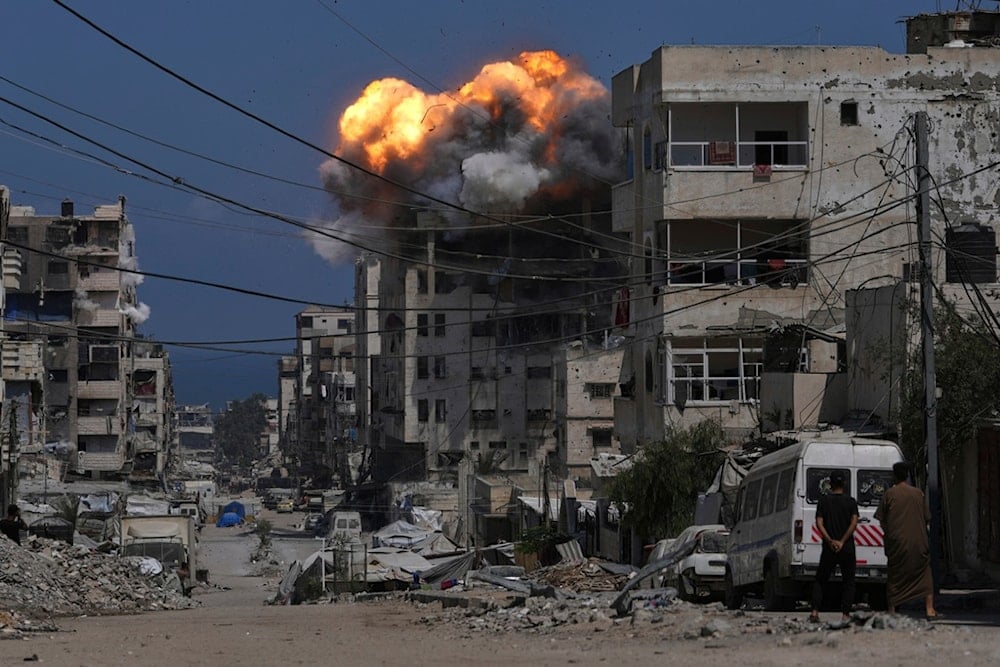Hamas intensifies efforts to end Gaza war, humanitarian crisis
Hamas says it is working urgently with mediators to end the Gaza war, stop the famine, lift the blockade, and reach a dignified agreement for the Strip.
-

Smoke and flames erupt from an Israeli airstrike in Gaza City, Monday, July 21, 2025. (AP)
The Palestinian Resistance group Hamas announced Monday that it is intensifying efforts around the clock to alleviate the worsening humanitarian catastrophe in the Gaza Strip.
In an official statement, the movement emphasized that ending the siege, famine, and ongoing war is its top priority in ongoing communications with mediators, governments, and all concerned parties.
Hamas stressed that these efforts come amid a continued campaign of genocide waged by the Israeli occupation against the Palestinian people in Gaza.
The movement noted that it is fully aware of the pressure tactics used by the occupation, particularly the deliberate targeting of civilians and mass killings in Gaza, as part of a broader attempt to extract political concessions it failed to obtain through negotiations.
Hamas: Negotiations continue responsibly, swiftly
Hamas reaffirmed its commitment to proceed with maximum responsibility and urgency in consultations with Palestinian factions and national forces. The goal, it said, is to reach a dignified agreement that ensures a halt to the aggression, an end to genocide, and the realization of key demands.
These include reconstruction, lifting the blockade, and securing a dignified life for the people of Gaza.
Qatar, Egypt, and the United States have submitted an updated ceasefire proposal to both Hamas and the Israeli occupation, according to a detailed report by Israeli Channel 12 on Wednesday.
The revised framework aimed to revive stalled negotiations and secure a comprehensive agreement that includes a temporary truce, prisoner-captive exchange, and scaled-down military presence in the Gaza Strip.
Updated draft ceasefire deal
The report identifies two major changes in the new draft: adjustments to the scope of the Israeli military withdrawal and slight modifications in the prisoner exchange formula, often described as a key talking point.
The proposal outlines a 60-day ceasefire period, during which Hamas would release 10 living Israeli captives and 18 bodies. In turn, "Israel" would free several Palestinian detainees and allow for a significant surge in humanitarian aid into Gaza.
While the exchange ratios remain largely intact, the new version introduces minor alterations. Earlier drafts had specified the release of 125 Palestinians serving life sentences and 1,111 others detained after October 7. An unnamed Israeli official cited by Channel 12 said that while "the changes are not expected to derail the talks," the key point of contention now lies in negotiating the exact list of names.
One of the most significant developments involves a notable shift in the Israeli occupation's military posture in southern Gaza. Previously, "Israel" demanded to maintain control over a 5-kilometer-wide zone north of the Philadelphi Corridor, adjacent to the Egyptian border.
Palestinian Resistance's stance on a ceasefire deal
On the Palestinian Resistance's position on ceasefire negotiations, al-Dali said it was made clear that no discussion regarding captive-related matters will occur unless three key conditions are met: a complete Israeli withdrawal from Gaza, the entry of aid according to the humanitarian protocol agreed upon in January, and clear guarantees to halt the aggression against Gaza, with negotiations continuing beyond the sixty days without a return to attacks on the territory.
The Resistance affairs analyst stressed that Hamas has made it unequivocally clear: negotiations cannot proceed based on maps that include provisions for Israeli forces to remain in parts of Gaza or for the forced displacement of Rafah's residents, whether northward or outside Gaza.
Al-Dali noted that the leaked maps have caused frustration in "Israel" and the US, as they revealed Netanyahu's true intentions: avoiding any meaningful withdrawal while pushing for a prisoner agreement without offering substantial political compromises, a stance now laid bare before mediators.

 4 Min Read
4 Min Read








